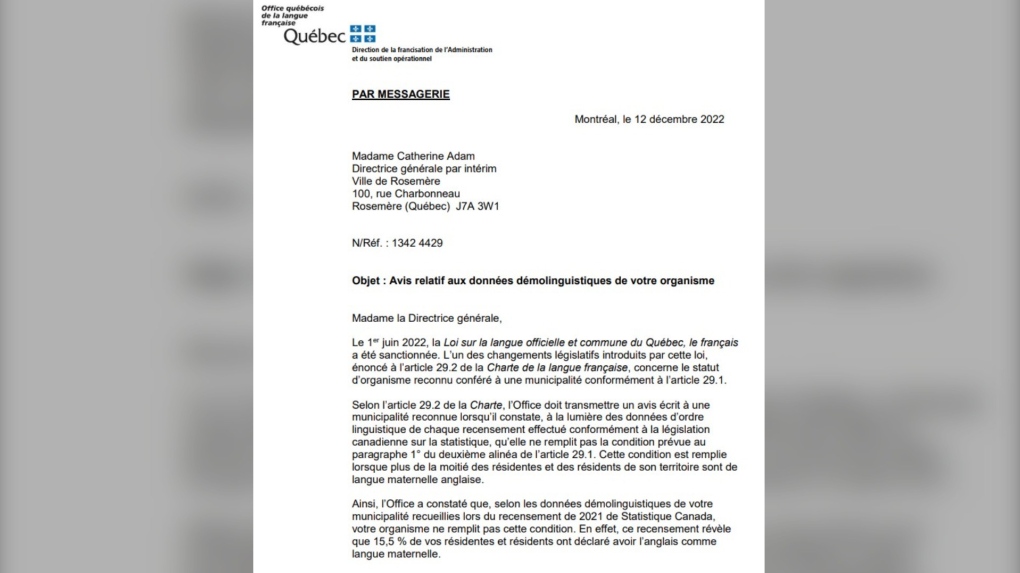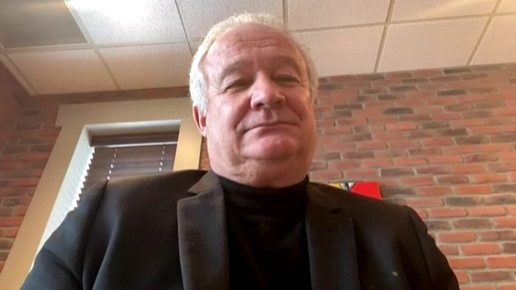DDO to keep bilingual status after falling short of Bill 96 English-language threshold
The Town of Dollard-de-Ormeaux (DDO) on Montreal's West Island has formally requested that the province maintain its bilingual status -- a move that Mayor Alex Bottausci said "saddens" him.
"It saddens me that this legal process must be invoked to protect the inherent right of our residents to receive communications in the language of their choice," said Bottausci in a Wednesday news release.
Council voted unanimously to keep their status on Tuesday after receiving a letter from Quebec’s language watchdog notifying the town that it didn't have enough native English speakers to be considered officially bilingual.
That threshold is 50 per cent under Quebec's French Language Charter, which was recently revamped by the controversial Bill 96.
According to the Office québécois de la langue française (OQLF), the body in charge of enforcing the law, only 45.2 per cent of DDO residents said English was their mother tongue in the 2021 federal census.
"Therefore, we inform you that under the second paragraph of Article 29.2, the recognition obtained by your municipality will be withdrawn," the OQLF wrote to the city's administration on Dec. 12, 2022.
The law allows the municipalities to maintain their status if requested, which DDO did on Tuesday.
"I am proud to lead a council that recognizes and celebrates the richness of having a bilingual and multilingual community," said the mayor.
"This process will allow Dollard-des-Ormeaux to maintain its bilingual status and continue to serve its residents in both official languages."
CITIES GIVEN 120 DAYS TO KEEP BILINGUAL STATUS
The OQLF sent letters to 47 other municipalities and boroughs last month informing them they need to pass their own resolutions within 120 days or risk losing their bilingual status.
See a map of the 47 municipalities listed in the letter.
DDO is among a growing list of municipalities and boroughs in Quebec that are taking action to hold onto their bilingual status.
On Monday, the Town of Otterburn Park, about 40 kilometres east of Montreal, passed its own resolution to remain officially bilingual, even though just 7.2 per cent of the population of roughly 8,000 residents has English as their mother tongue.
The Montreal suburb of Rosemere also plans to pass a resolution next week to retain its bilingual status.
The city, located on Montreal's North Shore, has about 15.5 per cent of its population identifying English as their mother tongue, according to the most recent census data.
"I understand that the Quebec government would like to put the emphasis on the right way to speak French, and to write French, but it doesn't mean that you have to basically eliminate all other languages," Rosemere Mayor Eric Westram told CTV News on Wednesday.
 A copy of a letter from Quebec's language watchdog to the City of Rosemere on Dec. 12, 2022, informing the city's administration that it will lose its official bilingual status in 120 days. (CTV News)
A copy of a letter from Quebec's language watchdog to the City of Rosemere on Dec. 12, 2022, informing the city's administration that it will lose its official bilingual status in 120 days. (CTV News)
Westram said English-language protection is important to his community to respect the city's heritage and he has no doubt the resolution will pass on Jan. 23.
"The founders of the city were people coming from England, Germany, Spain, and most of the immigrants in those years were basically speaking English, except the ones coming from France, obviously. So it was never a subject of dispute or anything," he said.
"We've been living in harmony in our city with this bilingual status …. To us, it makes us richer, miss this community more united, and it's never been a subject of dispute within the council and within the population."
 Eric Westram is the mayor of Rosemere. (Joe Lofaro/CTV News)
Eric Westram is the mayor of Rosemere. (Joe Lofaro/CTV News)
Prior to the passing of Bill 96, nearly 90 cities, towns and boroughs in Quebec were considered officially bilingual, a designation allowing them to offer services, post signage and mail communications in the country's two official languages.
Jurisdictions without this status must communicate only in French, with few exceptions.
Since its passing, the office has sent out 48 notices to jurisdictions that could lose their bilingual status, including Pierrefonds-Roxboro, where 36 per cent of residents listed English as their mother tongue, Kirkland (46 per cent), and Dorval (47 per cent).
CTVNews.ca Top Stories

Young people 'tortured' if stolen vehicle operations fail, Montreal police tell MPs
One day after a Montreal police officer fired gunshots at a suspect in a stolen vehicle, senior officers were telling parliamentarians that organized crime groups are recruiting people as young as 15 in the city to steal cars so that they can be shipped overseas.
'It was joy': Trapped B.C. orca calf eats seal meat, putting rescue on hold
A rescue operation for an orca calf trapped in a remote tidal lagoon off Vancouver Island has been put on hold after it started eating seal meat thrown in the water for what is believed to be the first time.
Man sets self on fire outside New York court where Trump trial underway
A man set himself on fire on Friday outside the New York courthouse where Donald Trump's historic hush-money trial was taking place as jury selection wrapped up, but officials said he did not appear to have been targeting Trump.
Sask. father found guilty of withholding daughter to prevent her from getting COVID-19 vaccine
Michael Gordon Jackson, a Saskatchewan man accused of abducting his daughter to prevent her from getting a COVID-19 vaccine, has been found guilty for contravention of a custody order.
Mandisa, Grammy award-winning 'American Idol' alum, dead at 47
Soulful gospel artist Mandisa, a Grammy-winning singer who got her start as a contestant on 'American Idol' in 2006, has died, according to a statement on her verified social media. She was 47.
She set out to find a husband in a year. Then she matched with a guy on a dating app on the other side of the world
Scottish comedian Samantha Hannah was working on a comedy show about finding a husband when Toby Hunter came into her life. What happened next surprised them both.
B.C. judge orders shared dog custody for exes who both 'clearly love Stella'
In a first-of-its-kind ruling, a B.C. judge has awarded a former couple joint custody of their dog.
Saskatoon police to search landfill for remains of woman missing since 2020
Saskatoon police say they will begin searching the city’s landfill for the remains of Mackenzie Lee Trottier, who has been missing for more than three years.
Shivering for health: The myths and truths of ice baths explained
In a climate of social media-endorsed wellness rituals, plunging into cold water has promised to aid muscle recovery, enhance mental health and support immune system function. But the evidence of such benefits sits on thin ice, according to researchers.
































